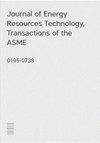研究不同流体和注入方式对碳酸盐岩储层粘土矿物膨胀迁移引起的储层岩石质量变化的影响
IF 2.4
3区 工程技术
Q3 ENERGY & FUELS
Journal of Energy Resources Technology-transactions of The Asme
Pub Date : 2023-03-23
DOI:10.1115/1.4062190
引用次数: 0
摘要
如今,随着科技的进步,对化石燃料的需求增加了。因此,提高现有油藏的采收率是关键问题之一。地层损害是一个公认的问题,它会导致油井的产能或注入能力下降。减少或控制地层损害是提高采收率的有效途径。造成地层破坏的机制多种多样,如细运移和粘土膨胀。本文研究了细运移和溶胀对碳酸盐岩渗透率的同时影响。选择高岭石和蒙脱石(膨润土)矿物分别作为迁移和膨胀的代表。首先进行了瓶试验,研究了不同流体对高岭石和蒙脱石溶胀电位的影响。根据高岭石的结构特点,它具有最小的阳离子交换容量(CEC),因此具有较低的溶胀倾向。因此,在所有液体存在的情况下,它显示出可以忽略不计的肿胀。从地层水(FW)和海水(SW)的高阳离子浓度来看,蒙脱石没有表现出高的溶胀作用。然而,稀释FW和SW增加了膨润土的膨胀倾向。纳米颗粒的粒径大于粘土层间距,不能有效控制膨润土的膨胀。同时还采用氧化锆作为消肿剂,效果良好。最后,采用特定粘土含量的合成碳酸盐岩心样品,尝试了不同的注入方案,确定了控制地层损害的最佳注入方案。本文章由计算机程序翻译,如有差异,请以英文原文为准。
Investigating different fluids and injection patterns on the effect of reservoir rock quality alteration due to swelling and migration of clay minerals at carbonate reservoirs
Nowadays, with the progress in technology, the demand for fossil fuels has increased. Therefore, improving the oil recovery from the current oil reservoir is among the crucial issues. Formation damage is a well-recognized subject that causes a reduction in the productivity or injectivity of an oil well. Reducing or controlling formation damage can be effective in improving oil recovery. There are various mechanisms that cause formation damage such as fine migration and clay swelling. In this study, the simultaneous effect of fine migration and swelling on the permeability of a carbonate rock was investigated. Kaolinite and smectite(bentonite) minerals were selected as the representative case for migration and swelling, respectively. Primarily, bottle tests were conducted to study the effect of different fluids on the swelling potential of the kaolinite and smectite. According to the structural feature of the kaolinite, it has the smallest cation exchange capacity (CEC) and consequently a low swelling tendency. Therefore, it showed negligible swelling in the presence of all fluids. According to the high cation concentration of the formation water (FW) and seawater (SW), smectite did not show a high swelling effect. However, diluting the FW and SW increased the swelling tendency of the bentonite. Nanoparticles were not able to control the swelling of the bentonite according to their larger size than the spacing of clay layers. Zirconium Oxychloride was also utilized as the swelling inhibitor which showed high efficiency. Eventually, different injection scenarios were tried using synthetic carbonate core samples with specific clay contents, and the best injection plan for formation damage control was determined.
求助全文
通过发布文献求助,成功后即可免费获取论文全文。
去求助
来源期刊
CiteScore
6.40
自引率
30.00%
发文量
213
审稿时长
4.5 months
期刊介绍:
Specific areas of importance including, but not limited to: Fundamentals of thermodynamics such as energy, entropy and exergy, laws of thermodynamics; Thermoeconomics; Alternative and renewable energy sources; Internal combustion engines; (Geo) thermal energy storage and conversion systems; Fundamental combustion of fuels; Energy resource recovery from biomass and solid wastes; Carbon capture; Land and offshore wells drilling; Production and reservoir engineering;, Economics of energy resource exploitation

 求助内容:
求助内容: 应助结果提醒方式:
应助结果提醒方式:


